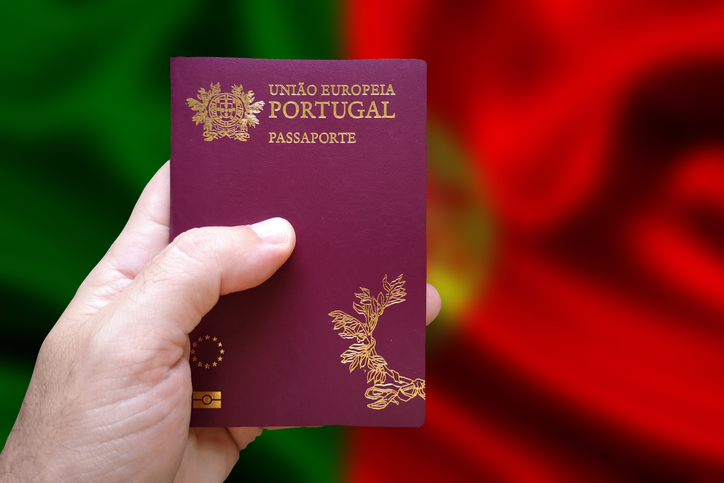x
Our website uses cookies. By continuing to use the site, you agree to our use of these cookies. To learn more about how we use the cookies and how you can manage them, please see our cookies policy.
Acquiring Portuguese nationality is a life-changing opportunity for many foreign nationals, offering an array of benefits from its robust healthcare system and access to the European Union. For those married or in a de facto union with a Portuguese resident, this pathway to citizenship is particularly accessible and perfect for strengthening cultural ties within the family. Applying for Portuguese nationality through marriage allows visa-less movement within the Schengen area. However, it’s vital that foreign nationals understand the application process and know what will be expected from them.
This guide will explore in detail the application process to become a Portuguese citizen through marriage or de facto union, as well as the benefits of cross-border immigration lawyers (Advogados).
Click on the links below to each section:
Discover the main issues that may arise during the Portuguese citizenship application process.
The different factors to consider and the criteria for applying to be a Portuguese citizen by marriage.
Read about the application process to become a Portuguese citizen through marriage or a de facto union.
Find out the various documentation needed to become a Portuguese citizen.
Discover Giambrone & Partners’ cross-border immigration services.
Read the most common queries on applying for Portuguese citizenship by marriage.
Applying for Portuguese citizenship by marriage can be complex, particularly for those unfamiliar with the intricacies of Portuguese law. Before starting the procedure, it is advisable to seek legal advice and consider the following challenges, and ways to resolve them:
In Portugal, language barriers can also add to the difficulty. Not only does the application process often require communication in Portuguese, but proficiency in the foreign language is a vital eligibility criterion. Applicants must pass a Portuguese language test (CIPLE) to at least a level A2, consisting of reading and writing (45%), oral comprehension (30%), and oral expression (25%).
A qualified lawyer can assist in navigating this requirement by recommending accredited courses or providing guidance on the exam process.
Portuguese nationality law recognises de facto unions for individuals in long-term relationships without formal marriage. However, proving such a union requires more extensive documentation and evidence, including proof of cohabitation for over three years. This can complicate the application process, as the burden of proof lies with the applicant.

Read more about the factors to consider before applying for Portuguese citizenship, such as by marriage or de facto union, here.
One primary challenge lies in navigating the differing legal systems, as immigration laws vary significantly between countries. Failure to meet precise requirements or misinterpreting these laws can result in delays or rejection of the application.
To help simplify the application process, consider seeking expert legal assistance from our immigration lawyers (Advogados) who understand what will be required of you, the differing citizenship laws, and explain potential complications that may arise.
Discover the services our Portuguese immigration lawyers can provide for you here.
Unlike the naturalisation pathway or the Golden Visa programme , there are no residency requirements if you are applying for citizenship in Portugal by marriage. However, you must prove your effective connection to Portugal, through integration into the community and culture, and proficiency in the language.
To apply for Portuguese citizenship through marriage or a de facto union, applicants must meet specific eligibility requirements:
Applying for Portuguese citizenship through marriage involves several steps and a fee of €250. It is essential to ensure the marriage remains valid throughout the process, as the application depends on this ongoing relationship.
The process begins by gathering and submitting all required documents to the Conservatória dos Registos Centrais.The documents provided must meet specific legal standards, including authentication and translation. After your documents are approved, you may be invited to take a Portuguese language and culture test. The interview and test aim to evaluate your level integration into the Portuguese community and assess your knowledge of its language and traditions.
If you have been married to your Portuguese spouse for more than five years, you may not need to provide proof of language proficiency. However, you must still exhibit a connection to Portugal through other means, such as your residence, professional ties, or community involvement.
Read more about the application process and the benefits of becoming a Portuguese citizen with our expert guide here.
When applying for Portuguese citizenship by marriage, submitting accurate and complete documentation is critical. These documents include:
The application process for Portuguese citizenship is often intricate, and enlisting the services of experienced English speaking immigration lawyers is strongly advised.
Giambrone & Partners’ cross-border immigration lawyers (Advogados) will advise you throughout the process of gaining Portuguese citizenship. Our lawyers will help gather the required documentation, and assess the validity of your application. Our expertise ensures your application is handled judiciously, reducing the risk of errors or omissions that could delay or jeopardise your approval.
Giambrone & Partners provide comprehensive guidance, from assessing eligibility and collecting necessary documents to facilitating communication with Portuguese authorities.
If you are interested in becoming a Portuguese citizen, or would like more guidance, request a callback with Giambrone & Partners’ multilingual and multijurisdictional lawyers here.
Your spouse must speak Portuguese, unless you have Portuguese children, for you to apply for citizenship. As an applicant, you must demonstrate knowledge of not only the Portuguese language but also the culture. This is key to proving your integration into Portuguese society and satisfying the eligibility criteria.